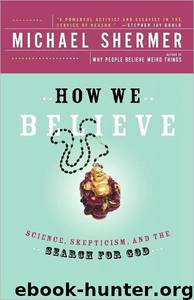How We Believe: Science and the Search for God by Michael Shermer

Author:Michael Shermer
Language: eng
Format: mobi
Tags: Non-fiction, Philosophy, Religion, Psychology, Science
ISBN: 9780805074796
Publisher: H. Holt
Published: 2003-10-01T00:00:00+00:00
Campbell’s theory, as described in his 1972 Myths to Live By, is that myths serve four functions: (1) mystical, which “serves to awaken and maintain the individual sense of awe and gratitude in relation to the mystery dimension of the universe, not so that one lives in fear of it, but so that he recognizes that he participates in it”: (2) explanatory, or “an image of the universe which will be in accord with the knowledge of the time, the sciences and the fields of action of the folk to whom the mythology is addressed”; (3) normative, or to “validate, support, and imprint the norms of a given, specific moral order, that, namely of the society in which the individual is to live”; and (4) guidance, or “to guide him [the individual], stage by stage, in health, strength and harmony of spirit, through the whole foreseeable course of a useful life.” This is a useful outline to help us get our minds around the varied culture of myths, but it is only answering how questions about myths at a proximate level. To know why humans need to experience the mystical, explain the world, create norms, or seek guidance, we need to consider myths from an evolutionary perspective.
A myth is a form of symbolic communication that invests stories not only with ordinary people and events but also with gods, supernatural beings, and extraordinary happenings, often unfolding in a place or time different from that of ordinary human experience. There are many themes and subjects embodied in myths: origins (cosmogony and creation), eschatology (end times and destruction), heroes (humans with special powers and experiences), time and eternity (ages of man, periods of history), providence and destiny (destiny, mastery over fate), memory and forgetting (prenatal existence, previous lives, collective unconscious), higher beings (celestial gods), founders of religions, nations, and peoples (Abraham, Moses, Buddah, Romulus and Remus, Siegfried), kings and ascetics (Arthur and Merlin), transformation (coming of age), rebirth and renewal (seasons and ages), and messianic and millenarian (second comings and new world orders).
If myths are to be explained on a deeper evolutionary level, then they must be universal for all peoples, including ourselves. Myths are not just someone else’s story, or stories that come from far-off times or places. We have plenty of myths of our own. Marxism was a political myth, as was pure laissez-faire capitalism, both providing explanatory, descriptive, and, most importantly, normative mythic functions. Freudian psychoanalysis was a psychosocial myth, as was Skinnerian behaviorism, both serving to justify and control human behavior. Science fiction provides descriptive myths, often of dystopian or paradisiacal future states of the world. This evolutionary explanation of myths, in fact, is itself explanatory mythmaking. The fact that scientific reasoning and empirical data are employed to support the argument makes it no less a myth—a story for us, of our time, that provides meaning and purpose.
In this regard, science is a type of myth, in both function and typology. To some degree, cosmologists give us origin and eschatology myths, from the Big Bang to the Big Crunch.
Download
This site does not store any files on its server. We only index and link to content provided by other sites. Please contact the content providers to delete copyright contents if any and email us, we'll remove relevant links or contents immediately.
The Art of Thinking Clearly by Rolf Dobelli(8843)
The 5 Love Languages: The Secret to Love That Lasts by Gary Chapman(8498)
Mindhunter: Inside the FBI's Elite Serial Crime Unit by John E. Douglas & Mark Olshaker(7834)
Becoming Supernatural by Dr. Joe Dispenza(7107)
The Road Less Traveled by M. Scott Peck(6635)
Nudge - Improving Decisions about Health, Wealth, and Happiness by Thaler Sunstein(6633)
Enlightenment Now: The Case for Reason, Science, Humanism, and Progress by Steven Pinker(6406)
Win Bigly by Scott Adams(6312)
Mastermind: How to Think Like Sherlock Holmes by Maria Konnikova(6236)
The Way of Zen by Alan W. Watts(5800)
Factfulness: Ten Reasons We're Wrong About the World – and Why Things Are Better Than You Think by Hans Rosling(4022)
The State of Affairs by Esther Perel(3931)
Gerald's Game by Stephen King(3918)
Man's Search for Meaning by Viktor Frankl(3634)
The Confidence Code by Katty Kay(3566)
Thinking in Bets by Annie Duke(3533)
The Worm at the Core by Sheldon Solomon(2918)
Enlightenment Now by Steven Pinker(2917)
Liar's Poker by Michael Lewis(2812)
